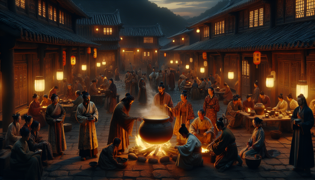The Legend of the Stone Soup
Reading Time: 12 min

About Story: The Legend of the Stone Soup is a Folktale from china set in the Ancient. This Descriptive tale explores themes of and is suitable for All Ages. It offers Cultural insights. A tale where hunger and wit unite a village in a magical communion of flavors and hearts.
Introduction
In the soft hues of an early autumn evening, when the air still carried the warmth of the summer sun and the first whispers of winter began to hint at their arrival, the quiet village nestled in the hills of ancient China exuded an air of cautious tranquility. The cobbled paths meandered lazily between clusters of thatched houses, their roofs worn by years of gentle rain and the passage of time. Lanterns, burned low with memories of past celebrations, flirted with the lengthening shadows as villagers prepared for another unassuming day to end.
Amid this peaceful routine, an invisible tension hummed beneath the surface—a tension born of scarcity and guarded hearts. The villagers, having endured a long season of meager harvests, had grown wary of outsiders and the promises of change that often came with them. Their lives were a patchwork of hardship and small joys, stitched together by mutual understanding and, at times, unspoken resentment borne from years of solitude.
It was under this sky, filled with both the brilliance of extinguished fireflies and the mystery of the gathering dusk, that a small troupe of weary travelers appeared on the horizon. Their presence was neither heralded by fanfare nor marked by the stereotypical trappings of fortune. Instead, there was a quiet urgency in their eyes—a hunger beyond mere physical need. They carried only a few battered scrolls, a couple of copper coins that had long lost their luster, and an inexplicable spark of hope that illuminated their journey. As the travelers approached the village gate, the scent of incense and woodsmoke mixed with the earthy aroma of the nearby rice paddies, heralding a night that would soon transform the hearts of the guarded villagers.
The Mysterious Arrival
The day the travelers arrived was at once unremarkable and yet fated to be remembered in the whispers of future generations. The village, accustomed to predictable rhythms of sowing and reaping, stirred with an uneasy mix of curiosity and caution as the strangers made their way through the arched entrance. The travelers, led by an elder with wise, shimmering eyes and a calm, resolute smile, carried with them a heavy air of both exhaustion and gentle determination.
Rumors quickly spread along the narrow lanes: some said these were lost souls seeking shelter, others believed they were emissaries of a long-forgotten imperial decree. Instead of offering the traditional sanctuary to a weary wanderer, the villagers exchanged guarded glances, questioning whether these strangers might bring misfortune or unwelcome change.
The elder, known as Master Liang, spoke in a voice that mixed soft thunder with the rustle of ancient bamboo. "Friends," he began with deliberate warmth, "we, too, have known hunger, loss, and fear. But tonight, let us remember that every hardship can be softened when shared." His words were not mere rhetoric; they carried a weight of sincerity that stirred something deep within the hardened hearts of the villagers.
Gathering in the central square, the villagers observed as the travelers set up a modest fire and laid out an assortment of unusual objects on a rough wooden table—a large, smooth stone, herbs bundled in cloth, and a simple, earthen pot. The stone, unadorned yet strangely inviting, became the centerpiece of their gathering. In a voice that was both playful and profound, Master Liang declared that this stone held the secret to a delicious soup unlike any other—a soup that would be made not from lavish ingredients but from the combined kindness of every person present.
A murmur of disbelief rippled through the small assembly. How could a stone, which had never tasted of spice or sweetness, possibly yield nourishment that could sate the body and spirit? Yet, as night drew its velvet curtains over the village, a curious blend of hope and uncertainty began to override the initial suspicion. Here was a proposition that required nothing more than the willingness to participate, a chance to prove that even when the pantry is bare, the human heart can be rich in generosity.

The Spark of an Idea
As the murmurs of the gathering subsided and the fire's embers began to whisper age-old tales, Master Liang gathered the villagers close with a proposal as unconventional as it was disarming. With a deliberate flourish, he produced the stone from beneath his robe—a smooth, unremarkable piece of granite that had traveled with him through many silent, starry nights.
"This, dear friends, is no ordinary stone," he said, his tone imbued with quiet conviction. "In many ways, it is like each of us—humble in substance yet filled with the possibility of transformation. Where one stone cannot create a meal, a collective of hearts can kindle a feast. Let us embark upon a shared journey: each shall contribute a piece of what they have, and in return, we will witness the birth of a communal soup that nourishes body and spirit alike."
There was a palpable hesitancy in the air, as if the villagers were caught between the rational voices of caution and the enticing call of communal warmth. Among the crowd, a young woman known as Mei Ling, with eyes bright as the first buds of spring, stepped forward. Her family had known hunger for many seasons, yet her heart remained open to the possibility of kindness. "I have a small bundle of rice," she offered softly, her voice trembling with both hope and trepidation.
In the distance, an elderly man with weathered hands and soft eyes—Old Chi—nodded slowly. With a measured tone that spoke of long years and many losses, he confessed, "I have a bit of dried fish, preserved from better times. Perhaps this stone might transform our fortunes if we remember our strength in unity."
As one by one, more villagers emerged from the folds of their cautious solitude, each offering what little they possessed—hardy greens from neglected gardens, a few fragrant spices, a handful of salted tofu. With every contribution, the air around the ancient cauldron seemed to shimmer with anticipation, as if the very essence of life were imbued within the simple act of sharing.
The idea had taken root, spreading like the soft tendrils of a vine along the bare walls of the collective heart. In that moment, as the fire crackled its gentle hymn and the weathered stone absorbed the energy of each gesture, the villagers began to see that their small sacrifices, when joined together, had the potential to create something magnificently greater than the sum of their parts. Master Liang's eyes sparkled with quiet amusement and deep empathy—it was not merely a matter of food, but a testament to human resilience and the transformative power of mutual care.

The Village Awakens
Night deepened, and with it, the silent transformation of hearts began its gentle work. In the quiet hours when the world seems suspended between reality and dream, every contribution to the stone soup became a symbol of remembrance and hope. The wooden cauldron, set over a modest brazier, accepted each ingredient with a melodious hiss as steam mingled with whispered prayers and shared stories.
Mei Ling, her hands trembling but determined, added her modest bundle of rice. Everyone watched, holding their breath, as the rice dissolved slowly into the boiling water, the grains releasing their hidden essence of sustenance. Old Chi carefully placed his dried fish into the pot. The aroma, at first foreign and skeptical, began to mingle with the scent of fresh greens brought by a young farmer who, with reluctant enthusiasm, confessed he had more than enough to spare. Even the local herbalist, who usually guarded her precious medicinal herbs as if they were enchanted relics, offered a few sprigs of mint and a pinch of mysterious wild spices.
The simple act of throwing in these humble contributions began to weave a tapestry of shared memory. More villagers, initially reticent, found courage in the collective warmth that the fire and the idea of transformation provided. They added handmade noodles, pickled vegetables wrapped in faded silk, and even a battered clay jar of preserved broth, each ingredient simmering in the cauldron as if releasing ancient alchemical secrets. The aroma, slowly coalescing into a symphony of delicate, alluring scents, wrapped around the gathering like a silken shawl, nurturing old wounds and instilling hope in hearts long resigned to solitude.
Amid the simmering stew, stories began to unfold. Elders recounted ancient legends of communal feasts during times of famine, legends that spoke of the miraculous power of solidarity. Children, their eyes wide with wonder, listened intently as the narrative of a legendary stone that had once fed a kingdom was brought to life through the present miracle of the soup. The storytellers' voices wove the past and present together, reminding everyone that adversity was best met with unity.
In a quiet corner, beneath the soft glow of a lantern, a skeptical widow found herself moved by the tender interplay of generosity and hope. Her eyes, which had seen many seasons of hardship and loss, now glimmered with the possibility of new beginnings. For the first time in many long years, the villagers—once isolated by their fears and guarded abodes—realized that the stone soup was not a trick or an illusion; it was a living manifestation of their combined spirit, a testament that even the humblest of contributions could nourish both body and soul.

Communal Transformation
As the night wore on and the first hints of dawn crept over the distant hills, the true magic of the evening began to take shape. The once solitary stone, surrounded by an array of disparate contributions, had transformed—both in the cauldron and as a symbol of a collective will. Its unassuming presence had spurred the villagers to reveal not only the surplus of their pantries but also the richness of their hidden compassion.
Master Liang, with gentle eyes that had seen enough life to know the pain of isolation, moved slowly among his new friends. He listened as villagers recounted stories of past hardships, of times when even a morsel of hope seemed unattainable. In each tale, there was a subtle undercurrent of longing for belonging, for a communal light to dispel the lingering shadows of suspicion. His voice, soft yet imbued with timeless wisdom, urged them: "Each of you has contributed not just ingredients, but a part of your story to this soup. Let this be the beginning of something greater—let our hearts, like our cauldron, be united by shared flair and purpose."
The stirring of the soup mirrored an equally stirring in the hearts of the gathered villagers. One by one, defenses crumbled, replaced by a burgeoning sense that, in unity, there lay a strength infinitely more potent than solitary wealth. The aroma of the soup, aromatic with a surprising blend of sweet, savory, and earthy notes, became a metaphor for life itself—a tapestry where every thread, no matter how humble, was vital to the overall masterpiece.
When the final droplets of steam whispered into the cool pre-dawn air, the villagers sat in companionable silence. Each face, illuminated by the first blush of dawn, bore an expression of quiet satisfaction and unspoken acknowledgment of the miracle they had wrought together. It was a moment steeped in both celebration and reflection: a collective epiphany that generosity and cooperation, when embraced wholeheartedly, could transform not just food, but communities, and even lives.
In that shared stillness, the stone soup had transcended its humble ingredients—it had become a living emblem of human solidarity, a beacon of hope for times when scarcity might threaten to divide rather than unite. The villagers, many of whom had long felt the isolating weight of distrust and misfortune, now felt a kinship that promised brighter days ahead. Their communal meal, a patchwork of disparate offerings, had forged bonds that promised to last far beyond the ephemeral warmth of that single night.

Conclusion
In the days that followed, the legend of the stone soup spread far beyond the boundaries of the once insular village. The story was recounted in hushed tones during family meals and exuberantly celebrated at local festivals. The once-thrifty and suspicious hearts had been warmed by the infusion of trust and cooperation, and every villager came to understand that the foundation of their community was not built on a single ingredient, but on the combined efforts and sacrifices of every soul who lived there.
Master Liang, long after the travelers had resumed their journey to distant lands, remained a cherished figure—a living reminder that wisdom often comes clad in humility. He would stroll through the village’s winding alleys, greeted by grateful smiles and nods of farewell, his eyes forever reflecting the spark of that transformative night. The cauldron, now a silent relic displayed in the central square, served as a lasting memorial to the miraculous power of a simple stone and the generosity of hearts united in common purpose.
Years later, children would play near its rusted exterior, oblivious to the gravity of its past, while elders recounted the tale with eyes twinkling in reminiscence. In every whispered retelling, the stone soup became more than food—it was a moral compass, guiding each generation toward a deeper understanding that adversity is best confronted with unity rather than isolation. The villagers learned that wealth could be measured not in possessions, but in the collective goodwill shared among them.
And so, the legend lives on—a timeless parable of hope, reminding us that in the simple act of sharing, in the courage to trust one another, lies the promise of transformation and a future where no one need suffer alone. The stone soup was a testament to the enduring truth that every small contribution, when brought together by love and compassion, can create a feast that nourishes both body and spirit.

















